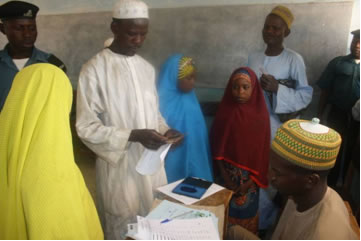Conditional Cash Transfers – A Ray of Hope (Kano)
Bilkisu grins from ear to ear as she effortlessly fills her section of the consent form allowing me to take photographs of her. Her chirpy banter with her mother and sister indicates a healthy family relationship. Her uniform is clean, her nails cut short and her rubber sandals patched, weather-beaten and a size too small, are covered with dust.
Bilkisu Jamilu and her sister Zaliha are beneficiaries of the Conditional Cash Transfer (CCT) programme in Kano State. CCT is a 3-year pilot scholarship programme to support girl’s education and is targeted at girls from poor families to help them access basic education. It is a partnership between ESSPIN-UKAID, the World Bank and the Kano State Ministry of Education. 3,000 girls from three ESSPIN-supported Local Government Areas (LGA) were selected by their communities to benefit from the programme. Kano state is the first in Nigeria to implement this pilot and the road to this important milestone was not without challenges. It took years of advocacy, reviews of the education reform strategy and behaviour change communication to attain government and community support.
The CCTs are small cash payments made to the families of girls to cover the incidental costs of attending schools (e.g. uniforms, stationery) and offset the lost income from street hawking. The CCTs are targeted at girls from poor homes in order to keep them off the streets and safe from the physical and psychological abuse they may encounter while hawking. Enrolment, attendance and performance are major pre-requisites to remain in the grants programme. The programme aims to maximize the transition of girls to Junior Secondary School thereby shielding them from the hazards of early marriage and as a result, reducing maternal and child mortality, empowering them with knowledge/skills to eventually raise the financial status of their families and improve their self esteem. CCT will give hope where there was none.
Bilkisu (12yrs) and Zaliha (10yrs) live with their parents and eight other siblings in Fagge LGA and attend Thimarul Quran Islmaiyya primary school. This school has also benefited from the ESSPIN water and sanitation programme with a functional borehole in place and toilets under construction. Their mother Hauwa says that the money they received will go a long way in providing uniforms and exercise books for the girls. She has a son attending University and has vowed that against all odds, her daughters will also attend tertiary institutions and attain their full potential.
On her thoughts about the CCT programme, Bilkisu admits that “the money will help my parents to tend to some of our educational needs. Even though it will not be able to cover all the costs, it will certainly ease the burden as there are 10 of us.”
Hajara Uba Fagge, a member of the School Based Management Committee at Bilkisu’s school remarked that CCT will help keep girls off the streets as it is customary that when poverty hits hard and a family is unable to keep all their children in school, the girls are the first to be withdrawn from school in order to turn to hawking to supplement their parents’ income.
ESSPIN is UKaid's flagship education sector development programme seeking to systemically and sustainably improve the way basic education in Nigeria is planned, managed and funded at Federal, State and Local Government level.
Conditional Cash Transfers are part of a ‘whole school development’ process. ESSPIN is working with government and civil society partners, including local communities, to address deficiencies in the quality of teaching and learning, head teacher leadership, the learning environment and resources reaching schools, and to thereby secure long term and significant improvements in the quality of basic education for Nigeria’s 32 million primary and junior secondary school students.

A proud father confirming the amount of the CCT